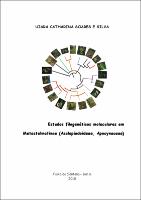| Compartilhamento |


|
Use este identificador para citar ou linkar para este item:
http://tede2.uefs.br:8080/handle/tede/1359| Tipo do documento: | Dissertação |
| Título: | Estudos filogenéticos moleculares em Metastelmatinae (Asclepiadoideae, Apocynaceae) |
| Autor: | Silva, Uiara Catharina Soares e  |
| Primeiro orientador: | Rapini, Alessandro |
| Resumo: | A subtribo Metastelmatinae (Asclepiadoideae, Apocynaceae) está bem distribuída ao longo do Neotrópico, com grande parte de sua diversidade concentrada nas regiões montanhosas do noroeste da América do Sul e do Brasil Central, além das ilhas do Caribe. Compreende 13 gêneros e cerca de 260 espécies cujas relações de afinidade são bastante complexas possivelmente devido à diversificação relativamente rápida e recente da linhagem, há cerca de 12 milhões de anos. O objetivo desse estudo foi reconstruir a filogenia de Metastelmatinae a partir de dados moleculares, incluindo mais de 70 espécies da subtribo, dentre elas Hemipogon abietoides, conhecida apenas pelo material-tipo coletado em 1825 e cuja afinidade taxonômica era motivo de debate. Para as análises filogenéticas, foram utilizados os marcadores plastidiais trnT-F, trnS-G, rps16, matK, psbA e trnE-Y, os dois últimos inéditos na família, e o nuclear ITS. As Análises de Máxima Parcimônia e Inferência Bayesiana produziram resultados incongruentes entre plastídio e ITS; uma Superárvore foi, então, produzida na tentativa de reunir esses resultados. Nove clados foram detectados pelas análises de plastídio, mas apenas dois deles foram recuperados com ITS. A Superárvore apresentou 18 clados sustentados, 23 ambíguos e 15 conflitantes. Nenhum gênero avaliado se mostrou monofilético, mas alguns padrões puderam ser detectados. A proximidade entre espécies eretas e volúveis de Hemipogon da Cadeia do Espinhaço, antes incluídas em Astephanus e Metastelma, apresentou alto suporte. Macroditassa é polifilético, com M. melantha aparecendo entre espécies de Ditassa, enquanto M. adnata (espécie-tipo do gênero) e M. macrophylla formam um grado em relação a Peplonia, justificando a sinonimização do gênero em Peplonia. Da mesma forma, Minaria se mostrou parafilético sem a inclusão de Barjonia harleyi e Hemipogon harleyi, justificando a transferência dessas espécies para o gênero. |
| Abstract: | [Molecular phylogenetic studies in Metastelmatinae (Asclepiadoideae, Apocynaceae)] Metastelmatinae is widely distributed in the Neotropic and most diversified in mountain ranges of the northwestern South America and Central Brasil, besides Caribbean islands. It includes 13 genera and about 260 species with complex relationships, possibly caused by the rapid and recent diversification of the lineage at 12 million years ago. The aim of this study is to recover the phylogeny of Metastelmatinae using molecular data and more than 70 species of the subtribe. During the expeditions, rare species were collected to fill important taxonomic gaps, including Hemipogon abietoides, known only because of the type collected in 1825 and whose taxonomic affinities have been discussed. For phylogenetic analyses, the plastidial regions trnT-F, trnS-G, rps16, matK, psbA, and trnE-Y, these last two are used for the first time in the family, and the nuclear ITS were sequenced. Parsimony analyses and Bayesian inferences produced several conflicts between plastidial regions and ITS. Topological information from the trees generated with plastidial regions and with ITS were fused in a Supertree. Nine clades emerged from the plastidial combined analyses, but only two of them were recovered by ITS. The Supertree presented 18 supported clades, 23 equivocal clades and 15 clades that conflict with the source trees. There is not any genus that emerged as monophyletic, but some patterns could be detected. Affinities between erect and voluble species of Hemipogon from the Espinhaço Range previously included in Astephanus and Metastelma presented high support. Macroditassa is polyphyletic, having M. melhantha among species of Ditassa whereas M. adnata (the type of the genus) and M. macrophylla form a grade to Peplonia, which justify the synonymization of the former genus in the latter. Likewise, without Barjonia harleyi and Hemipgon harleyi, Minaria is paraphyletic, justifying the transference of the two species to Minaria. |
| Palavras-chave: | Asclepiadaceae Incongruência filogenética ITS Marcadores plastidias Superárvore Asclepiadaceae Phylogenetic incongruences Plastidial markers Supertree |
| Área(s) do CNPq: | CIENCIAS BIOLOGICAS::BOTANICA CIENCIAS BIOLOGICAS |
| Idioma: | por |
| País: | Brasil |
| Instituição: | Universidade Estadual de Feira de Santana |
| Sigla da instituição: | UEFS |
| Departamento: | DEPARTAMENTO DE CIÊNCIAS BIOLÓGICAS |
| Programa: | Mestrado Acadêmico em Botânica |
| Citação: | SILVA, Uiara Catharina Soares e. Estudos filogenéticos moleculares em Metastelmatinae (Asclepiadoideae, Apocynaceae). 2010. 75 f. Dissertação (Mestrado Acadêmico em Botânica)- Universidade Estadual de Feira de Santana, Feira de Santana, 2010. |
| Tipo de acesso: | Acesso Aberto |
| URI: | http://tede2.uefs.br:8080/handle/tede/1359 |
| Data de defesa: | 16-Mar-2010 |
| Aparece nas coleções: | Coleção UEFS |
Arquivos associados a este item:
| Arquivo | Descrição | Tamanho | Formato | |
|---|---|---|---|---|
| Dissertação Gráfica.pdf | Arquivo em texto completo | 1,23 MB | Adobe PDF |  Baixar/Abrir Pré-Visualizar |
Os itens no repositório estão protegidos por copyright, com todos os direitos reservados, salvo quando é indicado o contrário.




